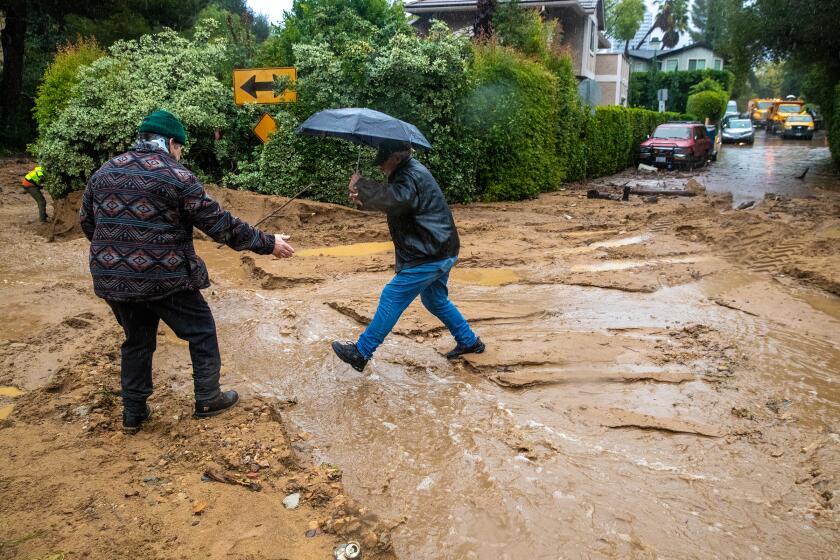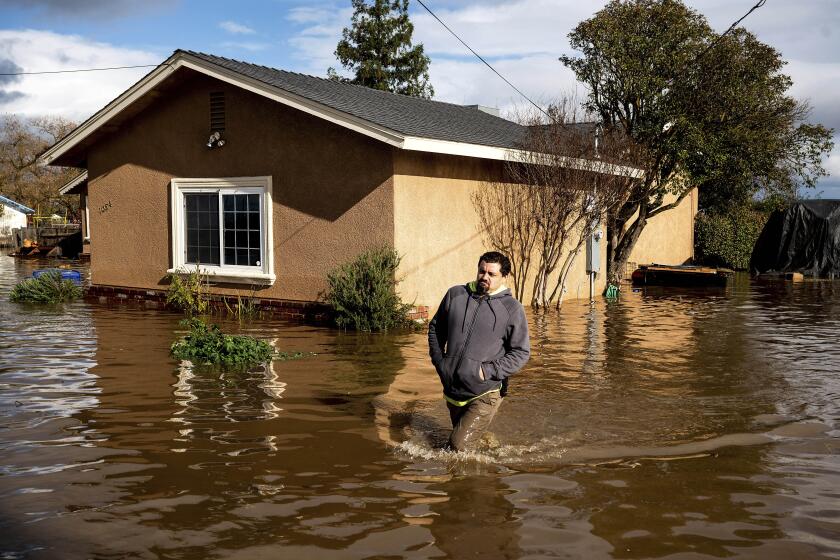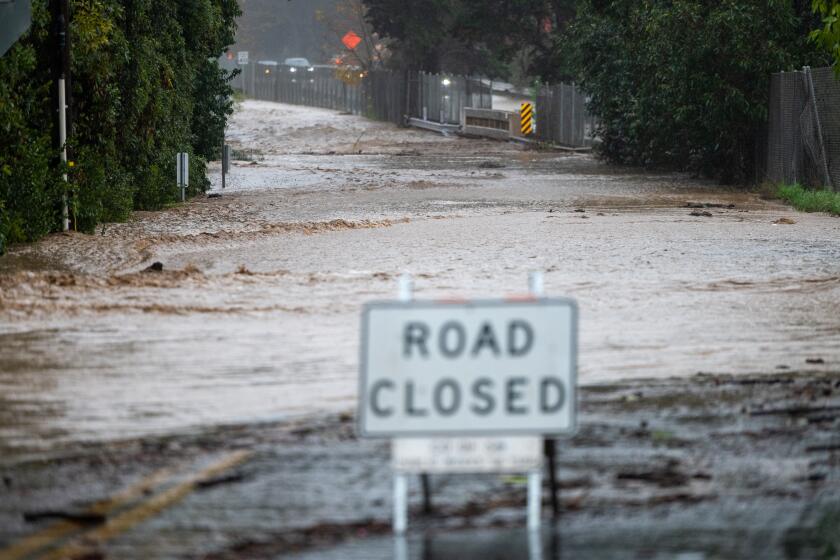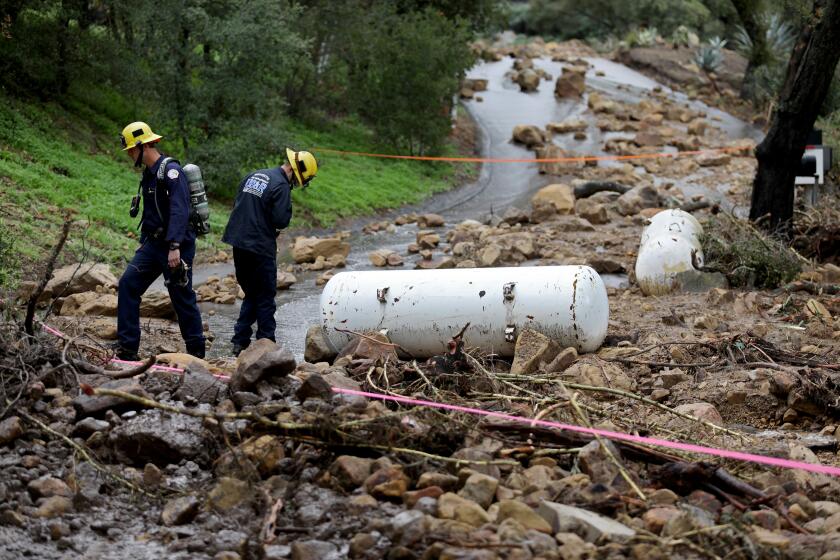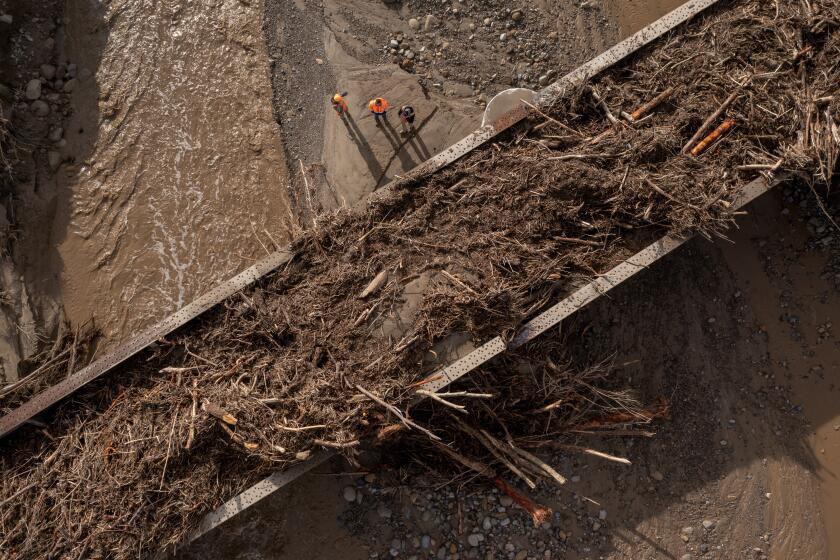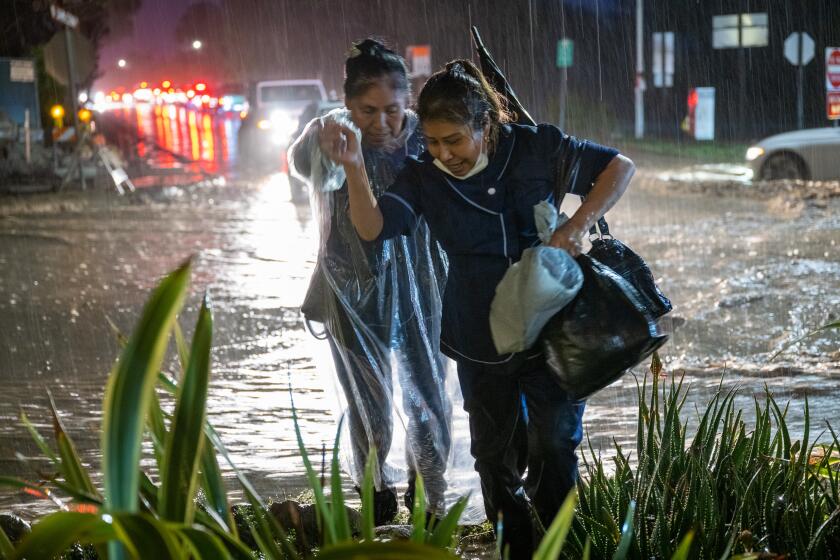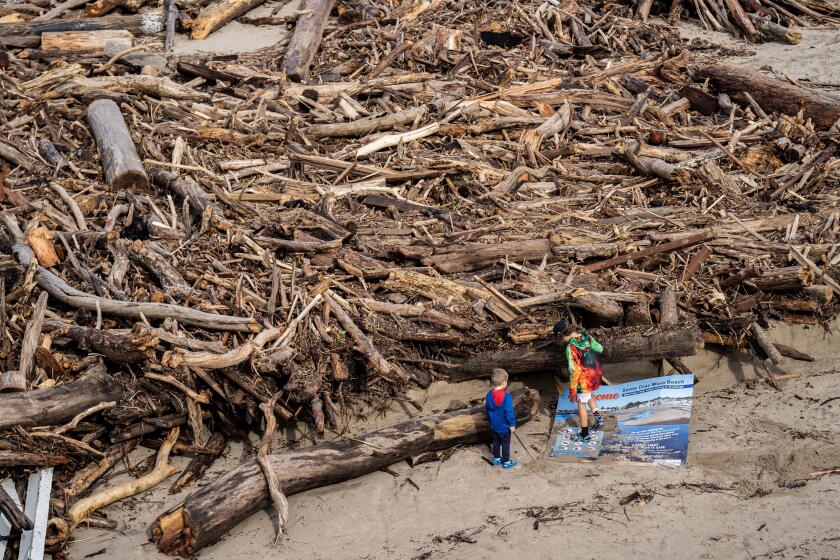L.A. digs out from mudslides, sinkholes and flooding — with another big storm on the way
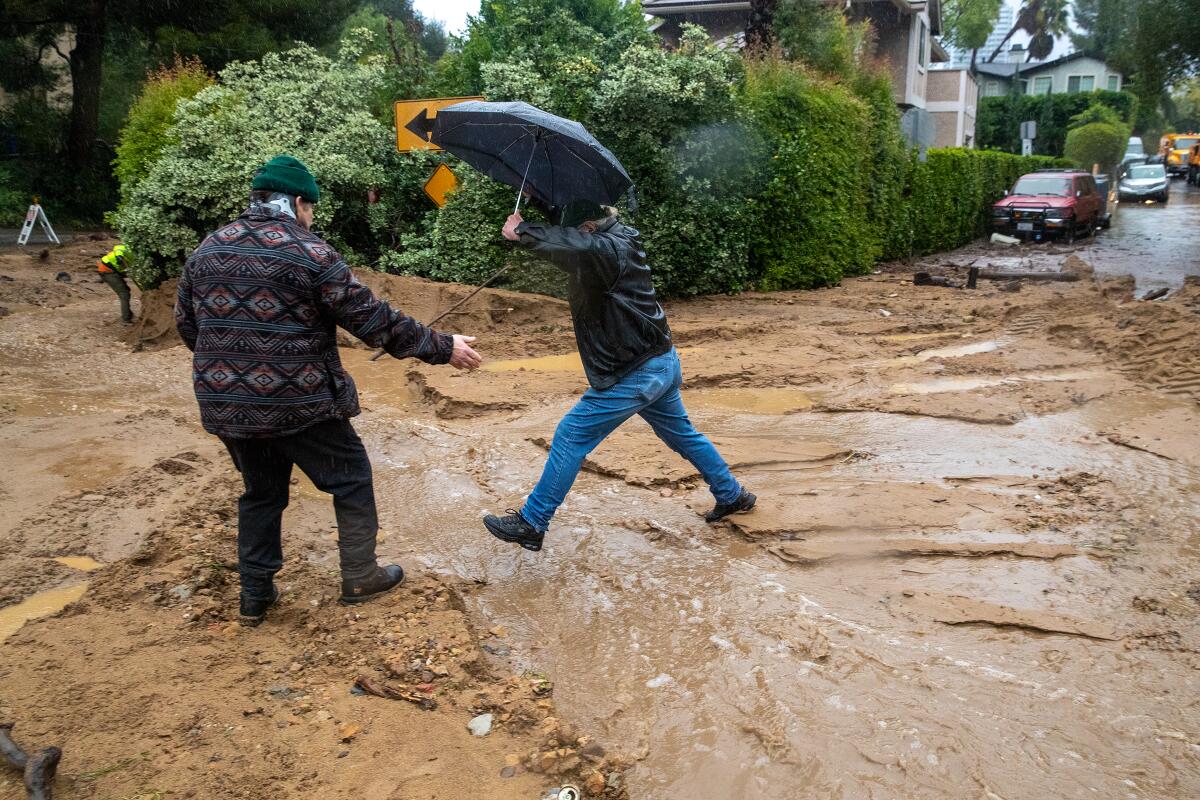
Southern California on Tuesday began digging out from a storm that forced mass evacuations, damaged homes, left roads impassable and made a muddy, wet mess of Los Angeles hillside neighborhoods.
The system has moved out of the region, but only after landing a powerful punch. The National Weather Service called it “the most impressive” storm since 2005, soaking some parts of the Central Coast with more than a foot of rain.
The latest in a series of atmospheric rivers to pound an already drenched California brought astonishing rainfall to L.A. County as well — including more than 6 inches in Bel Air, Porter Ranch, Woodland Hills and Alhambra; more than 5 inches in Beverly Hills, La Cañada Flintridge, Sierra Madre and Pasadena; and more than 4 inches in Agoura Hills and Calabasas.
“I’ve got a big, muddy mess to deal with, but it could have been worse,” said Universal City resident Dave Eichhorn, who awoke Tuesday to find his backyard, on the side of a steep hill, covered in mud. A patio table and chairs were buried under a few feet of it.
The rains left Los Angeles hillside areas with a lot of cleaning up to do, along with anxiety about the next storm.
A more than two-mile stretch of Mulholland Drive between Laurel Canyon Boulevard and Coldwater Canyon Drive will likely remain closed to through traffic for several weeks due to storm damage.
In downtown Los Angeles, Union Station flooded, forcing some commuters to navigate through standing water.
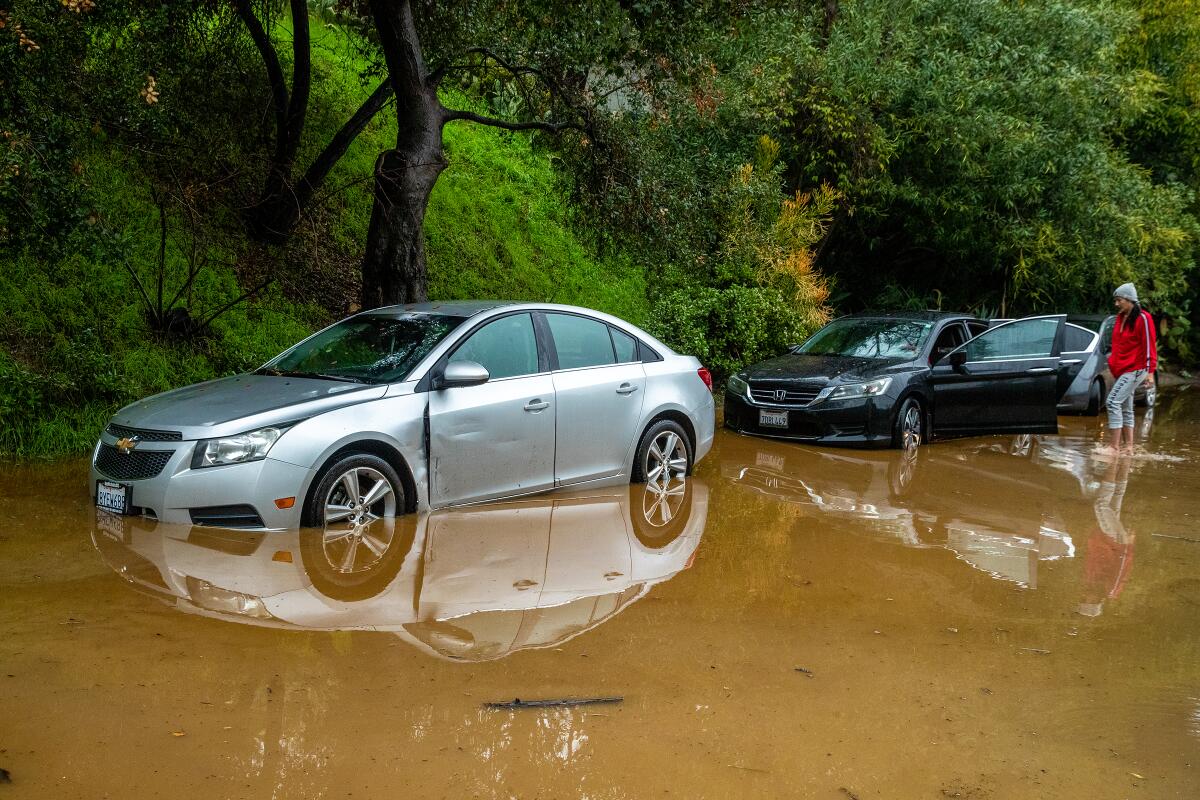
Crews worked Tuesday to evacuate 17 Studio City residents who were sheltering in place following a major mudslide. City workers armed with shovels and picks attempted to clear debris and mud that was piled at least 3 feet high at the intersection of Wrightwood Lane and Skyhill Drive. Neighbors observed from a distance as the river of mud pushed large logs, a pair of trash cans, basketballs and other material in all directions.
Around the corner, on Fredonia Drive, the muddy mixture penetrated a garage fitted with sandbags.
A NOAA expert thinks the costs of the atmospheric river hitting California could top $1 billion.
Studio City resident Sarah Hunt called to check on a friend as she took her 13-year-old German shepherd on a rain-soaked walk.
“I have several friends whose homes and properties flooded or had a mudslide,” Hunt said. “I still think we’re lucky that no one was hurt.”
For Hunt, there was a feeling of déjà vu. A documentarian, she was filming in Montecito when that community was struck by deadly floods and mudslides five years ago.
“The community helped each other during that crisis,” she said. “We need to do the same.”
On Studio City streets, cars sat in water that reached the top of the tires. Even cars in garages were not spared, as several buildings had flooded.
“This reminds me of the Central Valley,” said resident Eldon Daetweiler, 64, who grew up in Visalia. “It used to flood there all the time. That was expected. This, not as much.”
Headlights on. Foot off the gas pedal. And if you see a flooded street, turn around. Here are tips for driving safely as California gets drenched.
In Hollywood Hills West, a quarter-acre of hillside collapsed. No homes appeared threatened, but firefighters and search-and-rescue experts were dispatched, said Los Angeles Fire Department Capt. Erik Scott.
The storm also spawned a sinkhole Monday night in Chatsworth that swallowed a car, then a pickup truck.
The sinkhole, at least 50 feet wide and 30 feet deep, opened on Iverson Road just off the 118 Freeway. The Los Angeles Fire Department rescued two people from the car; the two in the truck escaped without assistance.
The vehicles sat in the chasm amid standing water, exposed drainage pipes and mounds of crumbling, wet earth.
“This really shocked us,” Chatsworth resident Bill Crane, 76, said of himself and his wife. “We couldn’t have imagined anything like this could have happened. I’ve been living here since 1997, and I’ve never seen anything like this or anything like this rain.”
The retired electrical technician said his home sustained minimal damage from the storm.
“With everything we’ve been seeing on TV, we’re lucky to have not been hurt,” he said. “I guess these people in the sinkhole are lucky to be alive too.”
At least 22 have died as a result of California’s recent intense storms, many from drowning and fallen trees.
After the storms left at least 17 people dead across California, Tuesday afternoon saw the weather clear for much of the state.
All evacuation and shelter-in-place orders were canceled in Montecito and the rest of Santa Barbara County. Authorities also lifted evacuation orders and warnings in Paso Robles and Ventura County.
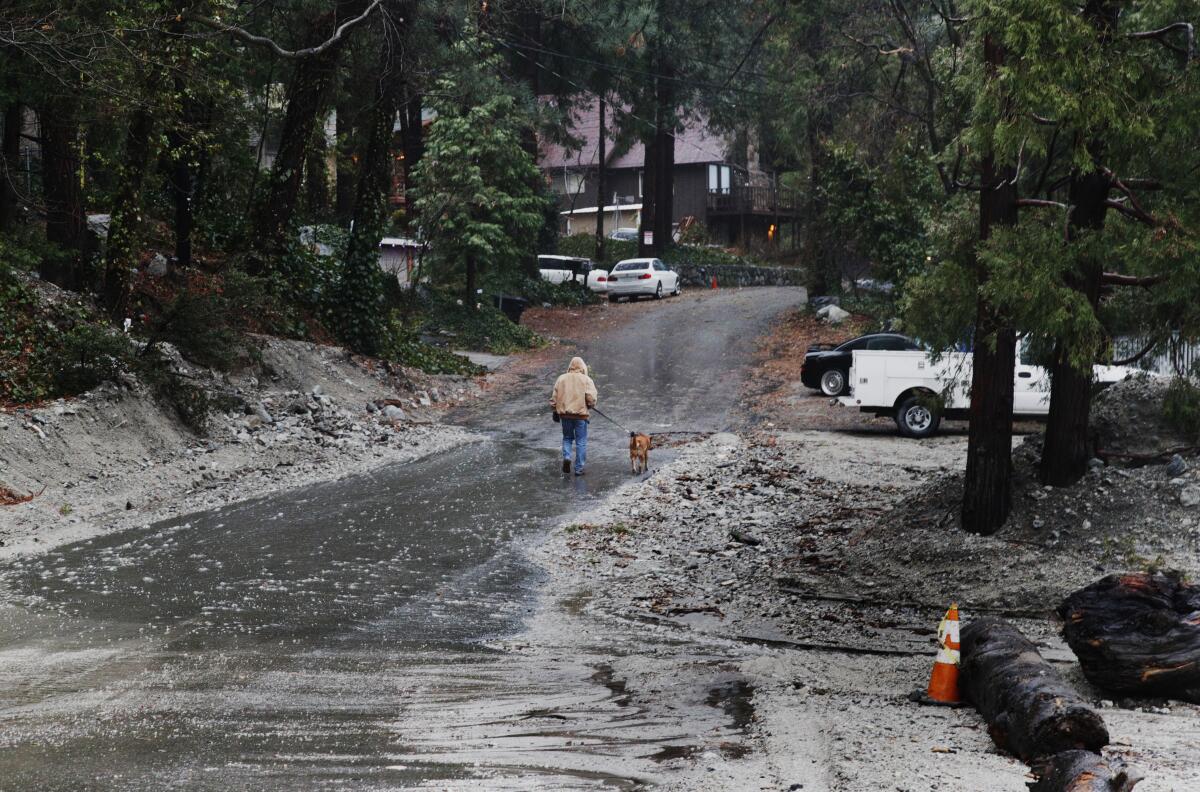
The powerful storm that knocked out power, toppled trees — including one that killed a toddler — and flooded homes along the coast in Santa Cruz continued its march through the region.
About 100 people were hunkered down early Tuesday in two American Red Cross evacuation centers in Carpinteria and Santa Barbara. Many were drivers who were stranded when authorities closed the 101 Freeway.
Among them was Chastnie Cribbs, 47, who stayed at the Carpinteria Veterans Memorial Building with her fiance, Eddie Sanchez, 57, and their dog, Chica. The couple was trying to return to San Pedro after a work trip in Washington. All hotels in the area were booked.
“I was pleasantly surprised by the setup,” Cribbs said. “Still, it was an experience — an experience I want to be over.”
While Northern California is expected to get hit by another storm Wednesday, Southern California won’t likely see significant rainfall until Friday, and more Saturday.
That storm will be “considerably weaker” than the one that just left but will “still be an above-average winter storm” in terms of rainfall amounts, according to the National Weather Service. Gusts of up to 40 mph could hit San Luis Obispo and Santa Barbara counties.
Scarred by disaster, Montecito residents remain on edge as evacuation orders are lifted a day after a massive storm.
Yet another storm is forecast to arrive late Sunday into Monday, Martin Luther King Jr. Day. This storm could be weak but slow, potentially lingering into Tuesday.
“So while rain rates could be lower, the duration of rain may be longer,” the weather service said.
Even weak storms are cause for concern among such a lengthy series.
“It’s not that any individual storm is a big scary one — it’s what are the cumulative impacts, because it’s really rare for us to get into storms seven, eight and nine,” said Michael Anderson, state climatologist at the California Department of Water Resources. “We just don’t have that many in the historical record.”
In the meantime, cleanup has begun.
Destructive storms will “rearrange the whole coastline” in battered Santa Cruz County
The L.A. City Council on Tuesday voted unanimously to allocate funding for repairs on Mulholland Drive, where a landslide last week caused serious damage near Summit Circle and on Iverson Road.
Councilwoman Nithya Raman thanked city departments and staff for their work during “an incredibly challenging time.”
“We had 18 residents who had mudslides in their backyard and have been advised to remain in their homes until we can dig some of them out,” Raman said. “A home near Laurel Canyon shifted off of its foundations entirely.”
Times staff writers Rong-Gong Lin II, Christian Martinez, Julia Wick and Hayley Smith contributed to this report.
More to Read
Sign up for Essential California
The most important California stories and recommendations in your inbox every morning.
You may occasionally receive promotional content from the Los Angeles Times.
